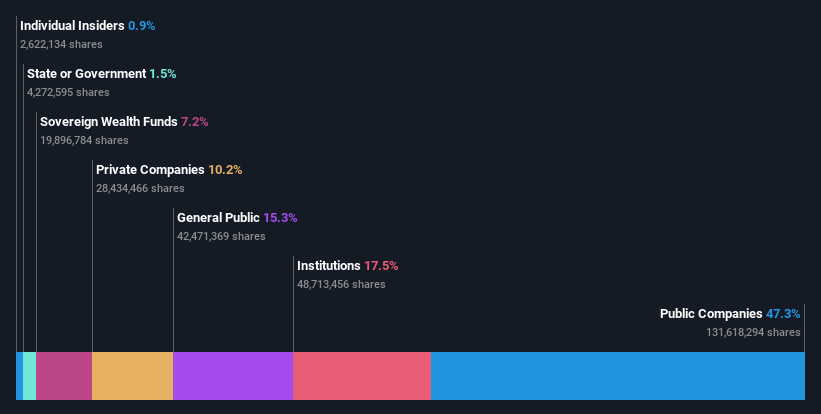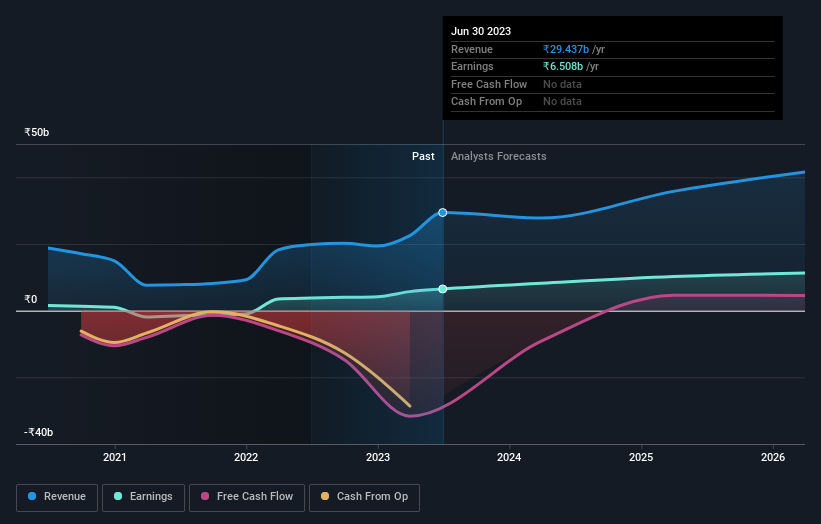- India
- /
- Real Estate
- /
- NSEI:GODREJPROP
Public companies who hold 47% of Godrej Properties Limited (NSE:GODREJPROP) gained 3.0%, institutions profited as well

Key Insights
- Significant control over Godrej Properties by public companies implies that the general public has more power to influence management and governance-related decisions
- 54% of the business is held by the top 2 shareholders
- Recent sales by insiders
To get a sense of who is truly in control of Godrej Properties Limited (NSE:GODREJPROP), it is important to understand the ownership structure of the business. With 47% stake, public companies possess the maximum shares in the company. That is, the group stands to benefit the most if the stock rises (or lose the most if there is a downturn).
Following a 3.0% increase in the stock price last week, public companies profited the most, but institutions who own 18% stock also stood to gain from the increase.
Let's take a closer look to see what the different types of shareholders can tell us about Godrej Properties.
See our latest analysis for Godrej Properties

What Does The Institutional Ownership Tell Us About Godrej Properties?
Institutions typically measure themselves against a benchmark when reporting to their own investors, so they often become more enthusiastic about a stock once it's included in a major index. We would expect most companies to have some institutions on the register, especially if they are growing.
Godrej Properties already has institutions on the share registry. Indeed, they own a respectable stake in the company. This implies the analysts working for those institutions have looked at the stock and they like it. But just like anyone else, they could be wrong. If multiple institutions change their view on a stock at the same time, you could see the share price drop fast. It's therefore worth looking at Godrej Properties' earnings history below. Of course, the future is what really matters.

Hedge funds don't have many shares in Godrej Properties. Our data shows that Godrej Industries Limited is the largest shareholder with 47% of shares outstanding. With 7.2% and 3.8% of the shares outstanding respectively, GIC Private Limited and Godrej & Boyce Manufacturing Company Limited are the second and third largest shareholders.
After doing some more digging, we found that the top 2 shareholders collectively control more than half of the company's shares, implying that they have considerable power to influence the company's decisions.
While it makes sense to study institutional ownership data for a company, it also makes sense to study analyst sentiments to know which way the wind is blowing. There are a reasonable number of analysts covering the stock, so it might be useful to find out their aggregate view on the future.
Insider Ownership Of Godrej Properties
The definition of company insiders can be subjective and does vary between jurisdictions. Our data reflects individual insiders, capturing board members at the very least. Management ultimately answers to the board. However, it is not uncommon for managers to be executive board members, especially if they are a founder or the CEO.
I generally consider insider ownership to be a good thing. However, on some occasions it makes it more difficult for other shareholders to hold the board accountable for decisions.
Our information suggests that Godrej Properties Limited insiders own under 1% of the company. But they may have an indirect interest through a corporate structure that we haven't picked up on. It's a big company, so even a small proportional interest can create alignment between the board and shareholders. In this case insiders own ₹4.4b worth of shares. Arguably, recent buying and selling is just as important to consider. You can click here to see if insiders have been buying or selling.
General Public Ownership
The general public, who are usually individual investors, hold a 15% stake in Godrej Properties. This size of ownership, while considerable, may not be enough to change company policy if the decision is not in sync with other large shareholders.
Private Company Ownership
It seems that Private Companies own 10%, of the Godrej Properties stock. It's hard to draw any conclusions from this fact alone, so its worth looking into who owns those private companies. Sometimes insiders or other related parties have an interest in shares in a public company through a separate private company.
Public Company Ownership
We can see that public companies hold 47% of the Godrej Properties shares on issue. We can't be certain but it is quite possible this is a strategic stake. The businesses may be similar, or work together.
Next Steps:
It's always worth thinking about the different groups who own shares in a company. But to understand Godrej Properties better, we need to consider many other factors. For example, we've discovered 1 warning sign for Godrej Properties that you should be aware of before investing here.
If you are like me, you may want to think about whether this company will grow or shrink. Luckily, you can check this free report showing analyst forecasts for its future.
NB: Figures in this article are calculated using data from the last twelve months, which refer to the 12-month period ending on the last date of the month the financial statement is dated. This may not be consistent with full year annual report figures.
New: Manage All Your Stock Portfolios in One Place
We've created the ultimate portfolio companion for stock investors, and it's free.
• Connect an unlimited number of Portfolios and see your total in one currency
• Be alerted to new Warning Signs or Risks via email or mobile
• Track the Fair Value of your stocks
Have feedback on this article? Concerned about the content? Get in touch with us directly. Alternatively, email editorial-team (at) simplywallst.com.
This article by Simply Wall St is general in nature. We provide commentary based on historical data and analyst forecasts only using an unbiased methodology and our articles are not intended to be financial advice. It does not constitute a recommendation to buy or sell any stock, and does not take account of your objectives, or your financial situation. We aim to bring you long-term focused analysis driven by fundamental data. Note that our analysis may not factor in the latest price-sensitive company announcements or qualitative material. Simply Wall St has no position in any stocks mentioned.
About NSEI:GODREJPROP
Godrej Properties
Engages in the real estate construction, development, and other related activities in India.
High growth potential with proven track record.
Similar Companies
Market Insights
Community Narratives



